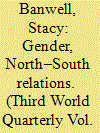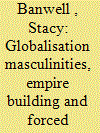| Srl | Item |
| 1 |
ID:
173903


|
|
|
|
|
| Summary/Abstract |
In 2017, American President Donald Trump reinstated the ‘global gag rule’(GGR). This order bans new funding to nongovernmental organisations that provide abortion as a method of family planning, lobby to make abortion laws less restrictive, or provide information, referrals or counselling on abortions. In the same year the Trump administration defunded The United Nations Population Fund (UNFPA). The latter is reviewed against the backdrop of the conflict in Syria. These policies draw upon, and reproduce, normative representations of women as vulnerable, weak, passive and maternal. Focusing on women’s access to abortion following wartime rape, the meanings and implications of these policies are reviewed. Transnational and postcolonial feminist perspectives are used to unpack the core themes of this piece: gender, reproductive health care and foreign economic policy. Three main arguments are made: (1) US foreign policy on abortion under the Trump administration draws implicitly on conservative ideas about gender, sexuality and maternity; (2) denying female survivors of rape access to abortion – which is discriminatory and violates key international instruments – is a form of structural violence that amounts to torture; and (3) the GGR and the defunding of UNFPA reproduce structural inequalities between the Global North and the Global South.
|
|
|
|
|
|
|
|
|
|
|
|
|
|
|
|
| 2 |
ID:
080624


|
|
|
|
|
| Publication |
2008.
|
| Summary/Abstract |
Decisions that affect the life chances and wellbeing of citizens are increasingly being made in international settings that are only indirectly connected to the democratic institutions where those citizens have a voice. Global and regional governance organizations not only lack the democratic legitimacy of states but also there are few mechanisms that make them accountable to the citizens that their decision making most affects. Civil society groups have exposed this gap between the jurisdiction and the impact of supra-state organizations and have proposed various ways of addressing it. Feminist analysis has highlighted the masculine preserve of traditionally closed-door multilateral trade and security discussions and negotiations. It has also highlighted the unequal and deeply structural gender impact of this style of policy making. Women's movements have found international organizations to be especially challenging institutional settings within which to achieve policy influence. Yet transnational feminist networks have the political and ethical resources to make global governance organizations more accountable to a broader constituency. This article explores this phenomenon through an examination of the Women Leaders' Network (WLN) and its efforts to make Asia Pacific Economic Cooperation more accountable to women as political and economic actors. The WLN is the only women's transnational advocacy network to have directly and routinely engaged with an economic intergovernmental organization. An analysis of the limits and potentials of the WLN model highlights accountability issues for APEC (Asia Pacific Economic Cooperation) and other regional or global governance organizations, as well as for the WLN and transnational civil society networks more generally
|
|
|
|
|
|
|
|
|
|
|
|
|
|
|
|
| 3 |
ID:
139018


|
|
|
|
|
| Summary/Abstract |
Adopting a transnational feminist lens and using a political economy approach, this article addresses both the direct and indirect consequences of the 2003 war in Iraq, specifically the impact on civilian women. Pre-war security and gender relations in Iraq will be compared with the situation post-invasion/occupation. The article examines the globalised processes of capitalism, neoliberalism and neo-colonialism and their impact on the political, social and economic infrastructure in Iraq. Particular attention will be paid to illicit and informal economies: coping, combat and criminal. The 2003 Iraq war was fought using masculinities of empire, post-colonialism and neoliberalism. Using the example of forced prostitution, the article will argue that these globalisation masculinities – specifically the privatisation agenda of the West and its illegal economic occupation – have resulted in women either being forced into the illicit (coping) economy as a means of survival, or trafficked for sexual slavery by profit-seeking criminal networks who exploit the informal economy in a post-invasion/occupation Iraq.
|
|
|
|
|
|
|
|
|
|
|
|
|
|
|
|